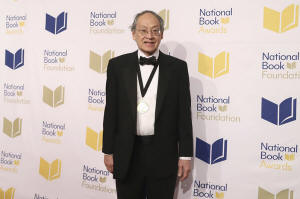Arthur Sze is appointed US poet laureate as the Library of Congress
faces challenges
[September 16, 2025]
By HILLEL ITALIE
At a time when its leadership is in question and its mission challenged,
the Library of Congress has named a new U.S. poet laureate, the
much-honored author and translator Arthur Sze.
The library announced Monday that the 74-year-old Sze had been appointed
to a one-year term, starting this fall. The author of 12 poetry
collections and recipient last year of a lifetime achievement award from
the library, he succeeds Ada Limón, who had served for three years.
Previous laureates also include Joy Harjo, Louise Glück and Billy
Collins.
Speaking during a recent Zoom interview with The Associated Press, Sze
acknowledged some misgivings when Rob Casper, who heads the library’s
poetry and literature center, called him in June about becoming the next
laureate. He wondered about the level of responsibilities and worried
about the upheaval since President Donald Trump fired Librarian of
Congress Carla Hayden in May. After thinking about it overnight, he
called Casper back and happily accepted.
“I think it was the opportunity to give something back to poetry, to
something that I’ve spent my life doing,” he explained, speaking from
his home in Santa Fe, New Mexico. “So many people have helped me along
the way. Poetry has just helped me grow so much, in every way.”

Sze’s new job begins during a tumultuous year for the library, a
200-year-old, nonpartisan institution that holds a massive archive of
books published in the United States. Trump abruptly fired Hayden after
conservative activists accused her of imposing a “woke” agenda,
criticism that Trump has expressed often as he seeks sweeping changes at
the Kennedy Center, the Smithsonian museums and other cultural
institutions.
Hayden’s ouster was sharply criticized by congressional Democrats,
leaders in the library and scholarly community and such former laureates
as Limón and Harjo. It also led to a debate over who has the authority
to decide on an interim replacement.
Although the White House announced that it had named Deputy Attorney
General Todd Blanche as the acting librarian, daily operations are being
run by a longtime official at the library, Robert Randolph Newlen.
Events such as the annual National Book Festival have continued without
interruption or revision.
Laureates are forbidden to take political positions, although the
tradition was breached in 2003 when Collins publicly stated his
objections to President George W. Bush’s push for war against Iraq.
Newlen is identified in Monday’s announcement as acting librarian, a
position he was in line for according to the institution's guidelines.
He praised Sze, whose influences range from ancient Chinese poets to
Wallace Stevens, for his “distinctly American” portraits of the
Southwest landscapes and for his “great formal innovation.”
“Like Emily Dickinson and Walt Whitman, Sze forges something new from a
range of traditions and influences — and the result is a poetry that
moves freely throughout time and space,” his statement reads in part.
[to top of second column]
|

Arthur Sze attends the 70th National Book Awards ceremony on Nov.
20, 2019, in New York. (Photo by Greg Allen/Invision/AP, File)
 Sze’s official title is poet
laureate consultant in poetry, a 1985 renaming of a position
established in 1937 as consultant in poetry to the Library of
Congress. The mission is loosely defined as a kind of literary
ambassador, to “raise the national consciousness to a greater
appreciation of the reading and writing of poetry.” Initiatives have
included Robert Pinsky’s “Favorite Poem Project,” for which the
public would share thoughts on works of their choosing, and Limón’s
“You Are Here,” which included poetry installations at national
parks.
Sze wants to focus on a passion going back more than a half-century
to his undergraduate years at the University of California, Berkeley
— translation. He remembers reading some English-language editions
of Chinese poetry, finding the work “antiquated and dated” and
deciding to translate some of it himself, writing out the Chinese
characters and engaging with them “on a much deeper level” than he
had expected. Besides his own poetry, he has published “The Silk
Dragon: Translations from the Chinese.”
“I personally learned my own craft of writing poetry through
translating poetry,” he says. “I often think that people think of
poetry as intimidating, or difficult, which isn’t necessarily true.
And I think one way to deepen the appreciation of poetry is to
approach it through translation.”
Sze is a New York City native and son of Chinese immigrants who in
such collections as “Sight Lines” and “Compass Rose” explores themes
of cultural and environmental diversity and what he calls
“coexisting.” In a given poem, he might shift from rocks above a
pond to people begging in a subway, from a firing squad in China to
Thomas Jefferson’s plantation in Virginia. His many prizes include
the National Book Award for “Sight Lines” and such lifetime
achievement honors as the Jackson Poetry Prize and the Ruth Lilly
Poetry Prize.

He loves poetry from around the world but feels at home writing in
English, if only for the “richness of the vocabulary” and the
wonders of its origins.
“I was just looking at the word ‘ketchup,’ which started from
southern China, went to Malaysia, was taken to England, where it
became a tomato-based sauce, and then, of course, to America,” he
says. “And I was just thinking days ago, that’s a word we use every
day without recognizing its ancestry, how it’s crossed borders, how
it’s entered into the English language and enriched it.”
All contents © copyright 2025 Associated Press. All rights reserved |